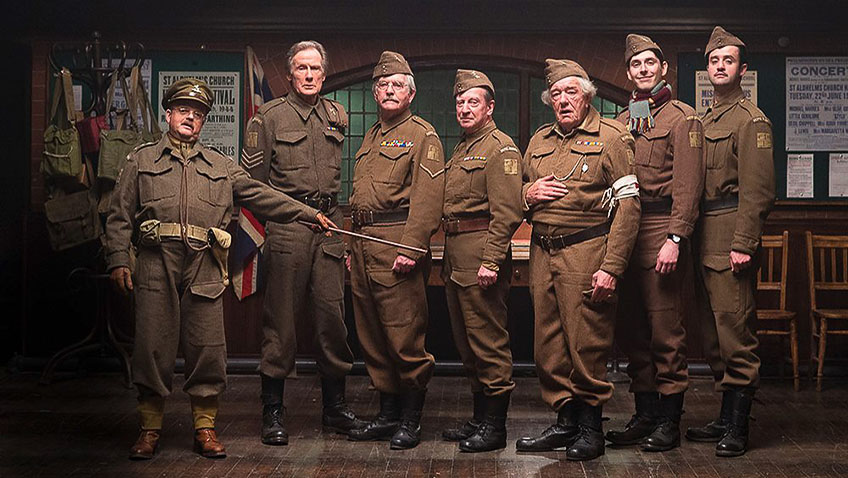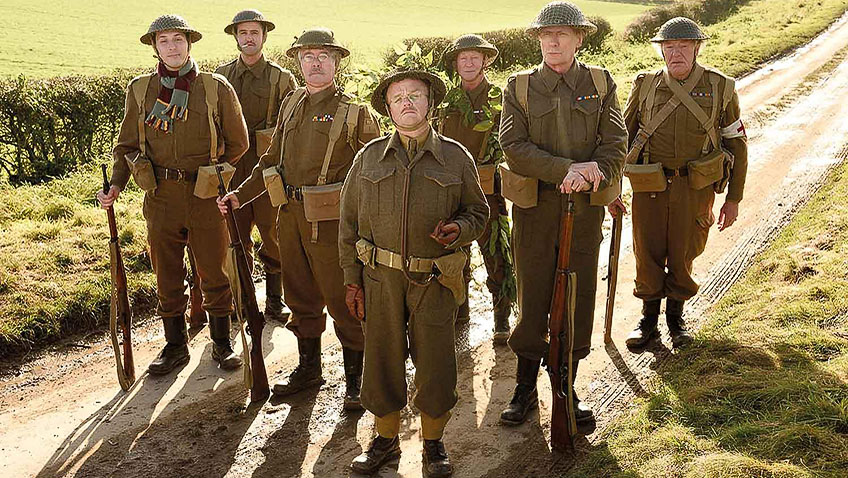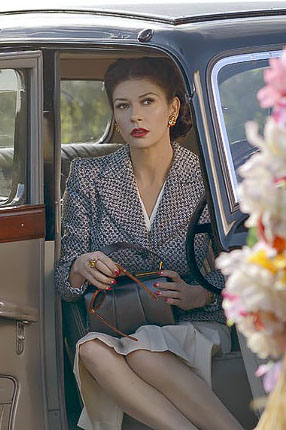Joyce Glasser reviews Dad’s Army (February 5, 2016) Cert. PG, 99 min.
Dad’s Army is probably not going to attract young audiences or revive interest in the series that ended 39 years ago. With its gentle humour and respectful nod to the original series (Ian Lavender and Frank Williams can be glimpsed in cameos), Oliver Parker’s film might satisfy those desperately seeking nostalgia.
Most people who participated in the real Home Guard are no longer with us, and those who remember the series (1968-1977) itself have no doubt moved on with television programming itself. Still, there is no denying that the feature length film version was not going to be caught out on comparisons of casting.
Parker (St Trinian’s, Johnny English Reborn, Dorian Gray, An Ideal Husband) and Producer Damian Jones (Lady in the Van, Iron Lady, The History Boys), specialise in gift-shop British humour, and have assembled one of the strongest ensemble cast of British A-list comic actors in memory with an average age of 53. But not even the unfaltering efforts of the older stars, including Michael Gambon, Toby Jones, Bill Paterson, Bill Nighy and Tom Courtenay can raise sufficient laughs from Hamish McCall’s script and Parker’s direction to justify resurrecting an outdated relic.
The film begins on a strong note with a spy plot that sees a German agent send a carrier pigeon in the direction of a German contingent hidden in wait off the Sussex Coast (the film was shot in Yorkshire). Although MI6 fail to stop the bird in time, two local brats shoot it down and it lands on a pair of young lovers picnicking in Walmington-on-Sea, one of whom is a volunteer in the Home Guard. The pigeon ends up on Sergeant Arthur Wilson’s (Bill Nighy) dinner table, but the message that is of the utmost importance to national security is tossed aside throughout the film.
Set in late 1944, in Walmington-on-Sea (Bridlington, South Yorkshire) Captain Mainwaring’s (Toby Jones) platoon is suffering from low morale. The core of the platoon are veterans who had fought in WWI and the younger men long to experience action. Then two things happen to change all this, although Bank Manager Mainwaring lacks the mental capacity to connect the two occurrences.
When a glamorous journalist with the oxymoronic name of Rose Winters (Catherine Zeta-Jones) shows up to do a story on the Home Guard for The Lady, only a couple of Miss Marple-like old ladies bother to verify her story. When they try to tell Mainwaring about their research into Winters’ background, he dismisses them with an air of self-importance. The men are too preoccupied with trying to impress Ms Winters to be suspicious when she shadows them on a top secret patrol or takes a photo of their map.
The second event that lifts the men’s spirits is the news that MI6 intelligence has placed a spy in Walmington-on-Sea. The Home Guard are elated to be assigned the task of finding the spy while protecting the shore from an imminent U-boat invasion.
As in the original series, the humour derives from the way in which the bungling Home Guard somehow manage to save the day despite being clueless and almost purposefully unobservant. The filmmakers also get a few smiles from Private Godfrey’s (Michael Gambon) onset of Dementia. When the men have infirmary practice, and effectively ‘play doctor’, he believes he really was shot in the chest.
If only, you start to feel, Gambon had been set free to adlib and improvise, he would have been even funnier.
More visibility is given to the wives and girlfriends than in the TV series, and their female Home Guard even plays a role in thwarting the Huns. That being said, Sarah Lancashire and Alison Steadman have little scope to show off their comic talent. Felicity Montagu fares better as Mainwaring’s stern, cold, but caring wife. She never materialises in the series, but the scenes between Jones and Montagu are some of the best in the film. There is a warmth and tenderness visible below the cool formality that characterises their relationship.
Toby Jones excels as the pompous Mainwaring who feels threatened by the intellectual superiority of Wilson, the retired professor. As his enthusiastic ineptitude is revealed and he is stripped of the command that gives his life meaning, he transforms into a vulnerable, emasculated little man – ready to prove himself in an act of real courage.

Michael Gambon, Tom Courtenay, Toby Jones, Bill Nighy, Bill Paterson, Daniel Mays and Blake Harrison in Dad’s Army
While chuckles and a few fond smiles suffice for television, to justify a feature film of this rehashed material, the film has to be non-stop laughs. And this is what is absent in Dad’s Army. The jokes do not even have to be subtle, but, when Mainwaring is told that Winters is the spy, his ‘joke’ reply, ‘Impossible! Girls can’t be spies,’ is one of the most redundant lines in cinema history. The whole plot revolves around the fact that these old fashioned, decent men cannot imagine a woman being a spy or lying about her identity. We get it already – enough!
The visual jokes are equally obvious, and although this is the nature of the comedy, there are limits. With Sergeant Wilson playing ‘Nazi’ on the run for the day, the men’s task is to find him before he reaches their flag. Just as Mainwaring brags to the newly-arrived Winters that they will find their spy because ‘not much gets past us,’ we see Wilson cycling behind Mainwaring. We did not need that because, of course, the real spy is right in front of him and that’s the joke there. Septuagenarian Lance Corporal Jones falls slips down a cliff and the men expose (and destroy) a costly and vital military subterfuge in trying to save him. This is neither the great plot point it aims to be nor a particularly funny sequence.
The gentle humour and sight gags sink into St Trinian’s-style sexual farce when all of the men willingly fall into the Honey Trap. At one point, Rose’s cottage on the coast resembles the set of Alan Ayckbourn’s Bedroom Farce. The comparison is particularly apt given the proximity of the film set to Ayckbourn’s Scarborough Theatre. It’s just a shame these scenes were not executed with Ayckbourn’s mastery of farce and immaculate staging.
You can watch the film trailer here:






